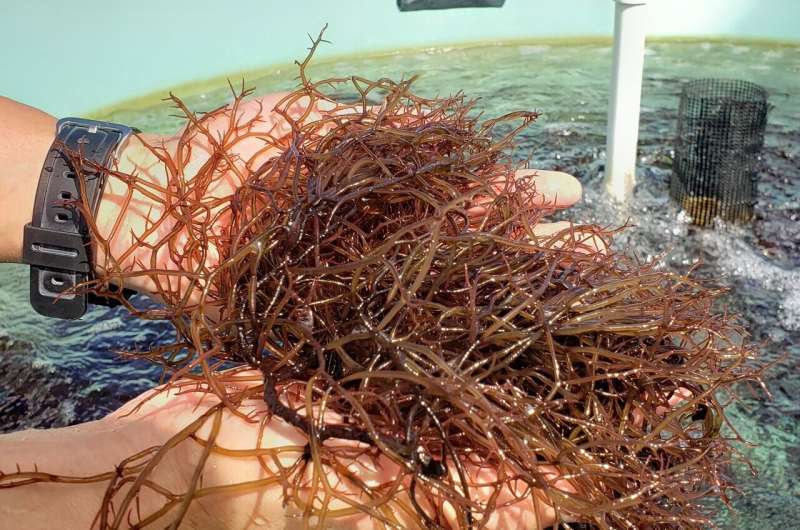
Some seaweeds, like the one shown here, are a source of important nutrients but may expose consumers to unsafe levels of heavy metals. Credit: ACS Food Science & Technology (2024). DOI: 10.1021/acsfoodscitech.3c00476
From sushi to soup, seaweed is a popular food around the world because it adds delicious flavor and beneficial nutrients to dishes. However, it may expose consumers to heavy metals that accumulate in the snow before it is harvested. Given the importance of seaweed in the Hawaiian Islands, recently ACS Food Science & Technology The book reports a comprehensive analysis of the essential nutrients and heavy metals of six types of seaweed collected in Hawaii.
Seaweeds accumulate nutrients in the environment where they grow. Scientists know that factors such as animal species or growing conditions affect essential minerals, nutrients, and heavy metals that are not essential or toxic to the use of seaweed. However, not much is known about the balance of beneficial and potentially harmful compounds in many species commonly eaten in Hawaii.
In addition, the US has not established safe regulatory limits for toxic substances such as arsenic and lead in all edible seafood, meaning that some products available for sale may not be tested for these compounds. Therefore, Kacie Ho and her colleagues decided to analyze the nutrients and essential metals in the seaweed grown in Hawaii.
The researchers found six types of seaweed that were cultivated or collected from the wild. They measured the beneficial nutrients and toxic substances in each species and used statistics to differentiate between the samples. They found that:
- Four of the six seaweeds tested were excellent sources of at least one essential mineral with more than 20% of the recommended daily intake for iron, manganese, or both calcium and magnesium.
- The amounts of protein, fat, carbohydrates and fiber varied greatly among the tested species, and generally corresponded to previous healthy tests of the three seaweeds.
- Two rare wild species, S. aquifolium and S . echinocarpum, have very high levels of compounds containing arsenic that exceed safe consumption limits established by other countries.
- Two domesticated species, H. formosa and G . parvispora, contains high levels of lead, exceeding those recommended for safe food in Taiwan.
Overall, the researchers found that Hawaiian seaweeds provide many important minerals and nutrients but may also expose consumers to unsafe levels of heavy metals, depending on factors such as seaweed species and growing conditions. Previously published research suggested that boiling or washing other types of seaweed, which were not included in this work, could remove harmful substances.
But these methods can also remove beneficial nutrients. Therefore, Ho and his colleagues collaborated with seaweed farmers to study the impact of growing environment and common cooking practices on the levels of heavy metals and nutrients in Hawaiian seaweed. Their findings could inform future regulations and ensure nutritious and safe seafood products.
Additional Information:
Samuel T. Kim et al, Determination of Nutrient Content and Toxic Substances of Seaweeds Collected and Cultivated from Hawai’i, ACS Food Science & Technology (2024). DOI: 10.1021/acsfoodscitech.3c00476
Provided by the American Chemical Society
An excerpt: Nutritional rewards and risks revealed for edible seaweed in Hawaii (2024, March 26) Retrieved 26 March 2024 from https://phys.org/news/2024-03-nutritional-rewards-revealed-edible- seaweed.html
This document is subject to copyright. Except for any fair dealings for the purpose of private study or research, no part may be reproduced without written permission. The content is provided for informational purposes only.
#Nutritional #rewards #risks #posed #edible #seaweed #Hawaii
Image Source : phys.org